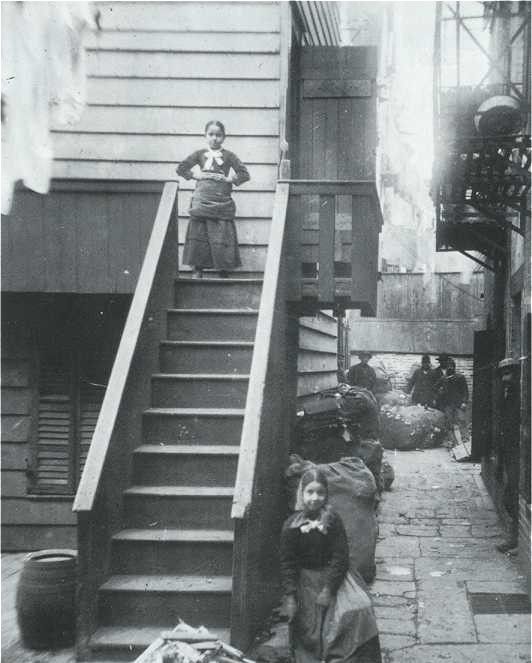This classic 1898 photograph of New York City’s Ragpicker’s Row was taken by the famed muckraking journalist Jacob Riis. This impoverished section of the city was described (in the most offensive manner possible) in a 1879 New York Times article, “Flowers for the Poorest.” In that piece, a journalist tagged along with the well-meaning but dopey Ladies’ Flower and Fruit Mission, as members of the group visited the poorest quarters of Manhattan and handed out free flowers. An excerpt:
“The visitors shook loose from the crowd of children that clung to them begging for flowers, and made their way to Mulberry-street, in search of ‘Ragpicker’s Row.’ They found it at Nos. 56 and 59, and here encountered poverty in the most squalid and filthy aspects. In the little courts lying between the front and rear houses water stood in sickening fetid pools. The houses swarmed with the Italians who collect refuse, rags, bones, and bits of paper from the ash-barrels, or who work on the garbage scows, and bring back to the City much of the refuse matter once thrown away as worthless. In these houses and in these yards this reeking refuse is sorted, dried, and made up into bales. Men, women, and children engage in the work, and all are alike dirty and ragged to a degree. Most of the men are low-browed ugly-looking fellows, and many of the women are toothless hags. Occasionally there is to be seen among them a young woman holding her swathed bambino in her arms, whose face is so beautiful that, with the flat head-dress–which many of them still wear–she might be the original of the Italian Madonna. These people were the most clamorous for the flowers of any kind that had been met; nor did they wait to be bidden, but many of them helped themselves from the baskets, laughing at the efforts of the visitors to prevent them and to secure an even distribution. In this way the baskets were quickly emptied, and the visitors were glad when they were, and they were at liberty to escape from the filthy yard and their noisy occupants.”
Tags: Jacob Riis

